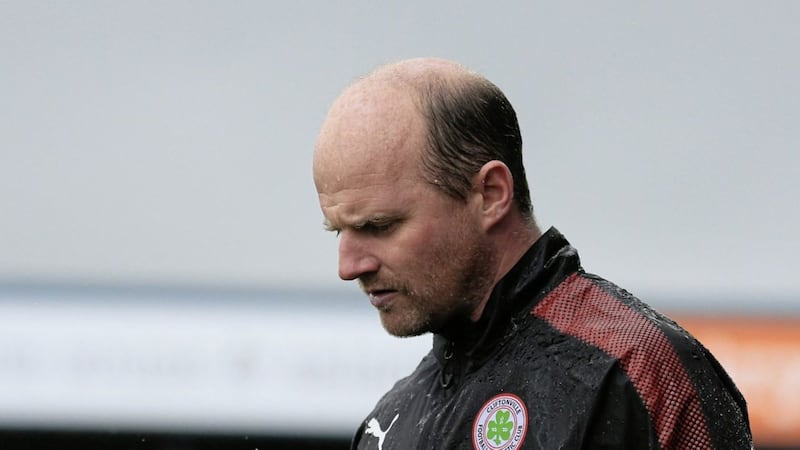JUST beneath the main stand at Seaview Barry Gray was fit to be tied.
Twenty minutes earlier, the Shore Road venue was heaving with Crusaders and Cliftonville supporters for the St Stephen's Day showpiece.
The Crues cantered to an easy 2-0 north Belfast derby win.
Referee Raymond Crangle might have missed a couple of crucial calls that led to Gavin Whyte’s two goals, but there was no disguising the fact how terrible Cliftonville were on the day.
Three days earlier, the Reds produced an equally tepid display against league champions Linfield at Windsor Park.
Apart from a bright opening quarter of an hour, the Reds surrendered far too easily to Linfield and put up even less resistance against Crusaders.
Gray emerged from the Seaview tunnel to carry out his media duties.
After years upon years of listening to managers after games having to choose their words carefully, just so as they don’t upset too many people, Gray took awaiting reporters by surprise.
One f-word wasn’t waiting on the other as the Reds manager absolutely tore into his players for their back-to-back performances against Linfield and Crusaders.
Here’s a flavour of what Gray said after the Crusaders defeat.
Describing his side’s performance as “pure sh***”, he continued: “These players are far too comfortable in their own wee zones. I’ve had opportunities to have a go at them for months and I haven’t.
“I’ve stood by them but in the two games over the three days, they’ve sent thousands of supporters back up the road with absolutely f*** all, bar a load of grumping.
“The people that we should feel sorry for are the people that have spent their hard-earned money across the Christmas period to come and watch the last two games because it’s been absolutely atrocious.
“There are three or four players prancing around thinking they have a name – and let me tell you, in my book, there are no names in there.
“You earn your name. They are far too comfortable in their own right because wee Jimmy or Joey [in the stands] thinks I’m a brilliant player. Their bubble will be burst very quickly.”
There was no stopping Gray at this point.
He added: “Our midfield controlled little to nothing, we forced balls into areas with a style of play that is f*** all to do with me because it’s nothing that we’ve worked on since I joined the club six months ago.”
I’ve got to know Barry Gray a little bit over the last few years. But since his astonishing post-match briefing at Seaview I’ve asked a few people that know him better than me – and they’ve all said words to the effect: ‘That’s Barry alright. He’ll tell you exactly what he told his players.’
Of course, many football people regard a manager laying into his players in public as simply off-limits, that it should never happen.
The prevailing wisdom of the day is how can there be collective responsibility in a team sport if the manager hangs his players out to dry?
Those same observers would regard such damning appraisals as a last desperate act of self-preservation from a manager under pressure and, in some instances, of someone who no longer has the respect of the changing room.
In his early days, one of Jose Mourinho’s greatest strengths was how he would never criticise his players in public.
In his first stint as Chelsea manager, he had built up an amazing loyalty among his players – and success flowed from there.
He’s since neglected this guiding principle and regularly cut into his players, both at Chelsea (the second time) and Real Madrid. Most of the time it was for was self-preservation purposes.
The Mourinho brand was put above every other consideration.
But that’s not to say a manager criticising his players should be off-limits in every case.
Prior to Euro 2016, the Republic of Ireland lost a friendly game to Belarus in Cork.
Assistant manager Roy Keane cut into some of the Irish players.
“I wanted to kill some of them last night,” Keane said.
“They should count their blessings they've managed to get on the flight - a reality check for one or two players who thought they were good players.”
Keane then launched a scathing attack on Aiden McGeady.
“He can do a lot better but maybe that's the story of Aiden's career,” added Keane.
“Would Aiden find himself lucky to be on the flight? Well, he'll need to play better than he did last night to force his way into the starting XI.”
Everything that Keane said was fair game because it had strategy behind it – albeit a ruthless one.
No amount of private cajoling or public massaging of ego has worked in seeing Aiden McGeady reach his potential as a footballer.
In many ways, Keane had nothing to lose and everything to gain by saying what he said about McGeady.
After all, the Republic of Ireland players were preparing for a career-defining major tournament.
Keane felt the team needed a rocket.
There is nothing wrong with bruising a few egos, as long as it’s done for the right reasons.
Timing is crucial too.
But, of course, that is not to say a manager hammering his players in public is not without risk.
It is obviously a card a manager can’t play too often in a season.
But these kinds of criticisms, while challenging the norms and values of team sport, shouldn’t always be viewed as a manager running away from his own responsibilities.
A manager is always accountable. They lose their jobs. Players rarely do.
I feel more scrutiny is needed surrounding this kind of changing-room ‘Omerta’ that governs what’s acceptable behaviour and what is not, particularly when this old-fashioned code singularly serves to protect one element of the changing room - the players.
Barry Gray had the moral authority to say what he said about his players after back-to-back performances that lacked in every department.
It did not sound like a manager running away from his responsibilities. It sounded like a manager trying to get his players to accept responsibility.
When players, quite patently, don't work hard enough they deserve to be called out by their manager.
God knows, there's enough PR guff and managerial clap-trap football supporters have to wade through as things stand.








